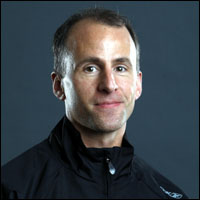by Elizabeth Casey || AHL On The Beat Archive
 Seated in the press box last year, watching his 150th game of the season, with no vested interest in the outcome, for the 150th time, Don Granato knew where he wanted to go: back behind the bench.
Seated in the press box last year, watching his 150th game of the season, with no vested interest in the outcome, for the 150th time, Don Granato knew where he wanted to go: back behind the bench.
“As a scout, it doesn’t matter to you which team wins,” said Granato, who spent the last two seasons as a pro scout for the Toronto Maple Leafs. “You go to the game and just watch. It started to drive me crazy after a while. I missed going into a rink and being a part of a team, I missed the competitiveness and intensity of our game.”
His two-year hiatus from coaching did have its perks.
“Scouting was very enjoyable and provided me with more perspective on the game – and it’s much more relaxing or laid back than being a coach,” he noted. “I didn’t have to show up at the rink each morning prepared to keep 20 players on the same page and moving forward. That is a big challenge in coaching, especially with the numerous ups and downs that occur throughout a season. For a scout, the grind is in the number of games you watch and the travel that it encompasses. Your performance is not linked to others, you only have to motivate yourself.
“The biggest thing I missed about coaching was competing. I didn’t enjoy going to the game and not being involved in it. That’s what excites me about being back. A challenge. Laying it on the line every night against your opponent. That’s excitement. That’s living. That’s why I want to be back in coaching, you feel like you’re alive.”
It may sound a little masochistic, but that kind of passion is just what general manager Kevin Cheveldayoff was looking for when he hired the Downers Grove, Ill., native as the new head coach of the Chicago Wolves.
“When we began our search for a new head coach, we wanted a person who embodied the “five C’s” that we felt were important to continue the growth of the franchise, while maintaining our expectation of excellence: confidence, conviction, communication, character and championships,” Cheveldayoff said. “After the extensive interview process, it was clear that Don was the perfect man for the job.
“He is a person that is very confident with undertaking the job at hand and with the high standards of excellence demanded of all Wolves employees. He has strong convictions on how the game should be played and on how to lead people, and is an excellent communicator with a proven history of teaching and developing talent. Don is also a person of extremely strong character and has a very well rounded coaching and playing career with extensive championship experience.”
Granato describes his coaching style in such a way that makes Cheveldayoff’s assessment seem spot on.
“Hockey is a sport that I’m passionate about. The sport itself is passionate. It’s a high-energy sport, it’s a great form of entertainment, and it’s a great sport to play. The best times in my life were playing hockey in the yard with my friends and family, so for me, that goes right into my coaching style,” he explained. “I want our players to be excited about playing. I don’t want to restrict them by being conservative or keep things too tight or defensive during a game. I want our guys to take in the experience of playing hockey, playing the game at a very high level.
“I like an up-tempo game,” he continued. “I like a high-energy game and some emotion, but controlled and within limits. I think there is an obvious need for structure and discipline but not so much that you smother individualism and originality, that does not interest me. The Wolves fans have been around many championships, and I think the one thing they can identify about all four championships is each team had a real synergy, a real mystique to it by the end. In my experience, you don’t get that by going overboard on discipline and structure. My feeling is that there must be a balance. My style is to make sure that balance is there. You have to create structure and discipline, but not to the point where I suppress a player’s natural ability and ability to develop further.”
His style also has the unique Chicago flavor that is only bred in natives of the Windy City, and he couldn’t be happier to be a part of an organization in his home town.
“I left home at 17, not because I wanted to, but because I wanted to follow hockey, and it has been 24 years before I could return here and be a part of a hockey team,” he reflected. “It’s funny, I didn’t think of it much before I took the job, but now after I’ve taken it, just being able to stay in my same home and drive to work each day, and be around family – I can go over to my parents’ house, my brothers’, my sister’s, whatever – that’s great. To have family more involved in what I do on a day-to-day basis and be around is something I’m looking forward to.”
In addition to that, Granato takes pride in what the Wolves’ success brings to the hockey community in Chicago, which he grew up a part of.
“It is obvious to me that the Wolves ownership and management has been very passionate and committed to making this team part of the Chicago community and they’ve done an incredible job to make this community proud to call the Wolves their hockey team,” he said. “It would have been a dream for me to come to these games as a kid, that’s the first thought I had at my first Wolves game a few years ago. I first walked in the building as an opposing coach and I remember the feeling…it felt like we were taking on everyone in the building, not just the 19 players the Wolves put on the ice that night. There was a sense of community in the building, a real synergy, and a real sense of objective and that objective was to win.”
“I have a lot of respect for Don Levin and Buddy Meyers, and the same for Chevy and John Anderson – the way they’ve led this franchise is different than others in our business. Every professional sports team talks about winning but these guys have done it over and over. In the process they have included and motivated thousands of people that have come into this building, including me.”
Given his investment in Chicago, his passion for the game and taste for competition, the next place Granato wants to go should come as no surprise.
“I know I am very fortunate to be a part of the Wolves franchise, it is quite an honor, but that said it is all about winning the Calder Cup and I will not be content without finding a way to contribute what I can to the next Wolves championship.”





































